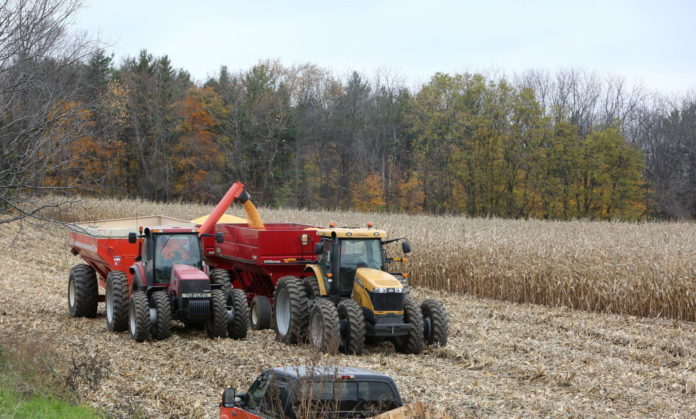Wisconsin corn growers and ethanol producers are looking to the EPA to “follow the law” on small refinery exemptions and make up for lost gallons. But the longer they wait for the EPA’s review and decision on the exemptions, the more the industry hurts.
“I would like to see the EPA and Administrator Wheeler just follow the law,” said Cal Dalton, a grain farmer in Endeavor. “I think it’s the culture of the EPA that doesn’t want to enforce the law; we’re fighting the culture of the EPA every step of the way.”
Four of the nine ethanol plants in Wisconsin have slowed down and decreased corn grind, he said. There are no oil refineries in Wisconsin.
According to the U.S. Energy Information Administration, Wisconsin is among the top 10 ethanol-producing states in the nation, and ethanol is one of the few energy resources that Wisconsin produces and sends to other states.
Earlier this year, the U.S. Court of Appeals for the Tenth Circuit ruled in favor of The Biofuels Coalition to overturn and reconsider ethanol exemptions for refineries in Wyoming, Oklahoma and Utah.
The Renewable Fuel Standard requires oil refiners and gasoline and diesel importers to mix biofuel volumes based on a percentage of its petroleum product sales or buy credits from those that do. In order to be exempt from volume obligations or purchasing credits, the refineries have to demonstrate disproportionate economic hardship.
The three refineries petitioned to extend their exemptions, but according to the court, the EPA wrongfully granted the petitions.
Twenty-three exemption petitions from 2019 are currently pending with the EPA while the agency consults with the White House on possibly changing the program. The EPA is expected to have a decision as early as next week.
Dalton believes the EPA may find quite a few of the applicants weren’t significantly impacted and shouldn’t qualify for the exemption.
“According to the law [the refineries] are supposed to use 15 billion [gallons of biofuel] and they didn’t — they used 13.5 or 14 billion a year,” said Dalton adding that he’d like to see the EPA restore the waived 1.5 billion gallons so that the biofuels producers are made whole.
“The issue is not settled,” said the American Fuel and Petrochemical Manufacturers’ president and CEO, Chet Thompson, in a statement following the ruling. “The 10th Circuit absolutely got the decision wrong.”
“Since the court ruled in January, the cost of compliance credits has more than doubled,” he said. “The ethanol industry has not lost a gallon of demand due to SREs. More of their product is being blended now than ever.”
According to the U.S. Department of Energy, renewable fuel has to be blended into transportation fuel in increasing amounts each year, escalating to 36 billion gallons by 2022.
Dalton argues the EPA “took our market away” by exempting refineries from meeting the renewable fuel standard.
“If we could get those numbers put back in and start to create demand again and get rid of some of this destruction we’ve seen from these exemptions, that would really really help us — not only in the ethanol industry and the rural communities that they support, but also these farmers with their commodity prices,” he said.
Dalton is a first-generation grain and cattle farmer who helped launch a 60 million gallon ethanol plant in Friesland called United Wisconsin Grain Producers, where he is currently the president. He also serves on the Wisconsin Corn Promotion Board.
According to Dalton, in the latter days of the Obama administration and into the Trump administration, there has been “an increase in exemptions offered to oil companies that really are not small refiners.”
Exemptions given to oil refineries have quadrupled in the four-year period from 2015 to 2018, according to statistics released by the EPA.
Dalton got involved with the ethanol plant not only to create a market in Wisconsin, but also as a way to boost corn prices. If the corn prices were low, he reasoned, then the ethanol market would help hold it up.
But that hasn’t been the case for the last four years.
“The ethanol price is as low or as bad as the corn price is,” said Dalton. “It’s been tough to watch our equity in our operation erode away.”
He argued that in Wisconsin, other industries such as dairy, beef and hog operations depend on ethanol for Distillers Dried Grains with Solubles. DDGS are a byproduct of making ethanol and are used as animal feed.
“If we are profitable that way, it translates to the other commodities too – we’ll bring the other commodities along,” said Dalton. “All around the Midwest where we’ve been hurt by these exemptions, it really has driven the price of the commodities down. It made it unprofitable to be farming and to be in the ethanol business.”
Ace Ethanol in Stanley and Fox River Valley Ethanol in Oshkosh are two of the plants that have cut back production, Neal Kemmet, president and general manager of the two, told WisBusiness.com.
According to Dalton, the ethanol plants can’t totally shut down in cold weather, because they’ll freeze up. They can operate at up to a 60 percent level.
“That’s less corn going to market early, so if the EPA takes away these exemptions and we create demand and the market picks up, the plants go back up to full capacity,” he said.
Wisconsin’s nine ethanol plants can produce more than 500 million gallons of ethanol per year.
The Wisconsin Corn Growers Association will travel to Washington, D.C. this month to lobby Wisconsin members of Congress about issues, including pushing the EPA to create more demand for corn and ethanol.
The USDA announced last week its goal to “increase biofuel production efficiency and competitiveness to achieve market-driven blend rates of 15 percent [E15] of transportation fuels in 2030 and 30 percent [E30] of transportation fuels by 2050.”
According to Dalton, corn and biofuel organizations are already working with car companies to develop engines that will burn E30. That would be a positive step for the ethanol industry, he said.
Still, he said “it’s still going to take awhile to get that pipeline of corn filled. The longer this goes on, the longer it’s going to take to get that demand built up for ethanol and for corn.”
–By Stephanie Hoff
WisBusiness.com






